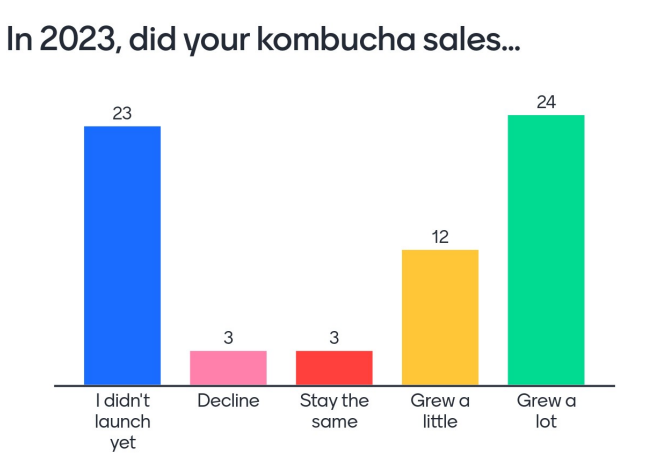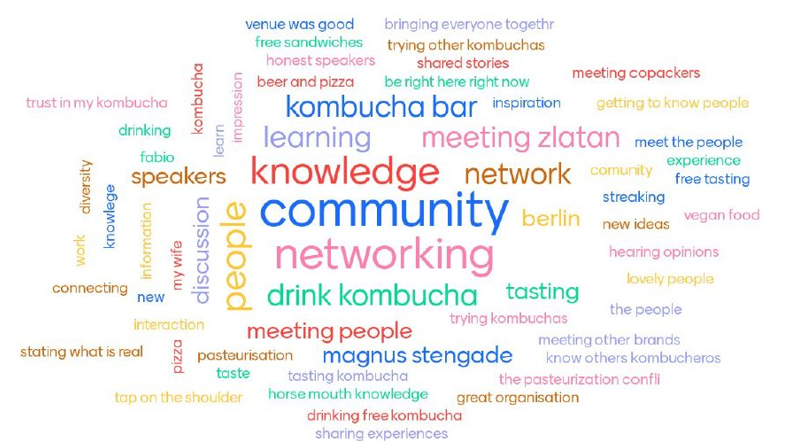The Kombucha Summit held in Berlin, Germany, from Nov 17-18, culminated with a compelling ‘Live Kombucha Industry Survey’ led by presenter Denis Kelleher, CEO of Good Culture Kombucha.
Over 70 of the 100+ attendees in the room took the opportunity to participate, using their phones to connect to the Mentimeter live polling program. Around 40% of responses were from established kombucha brands, with 30% in start-up mode and another 30% who had not yet launched.
The results – displayed in real-time – highlighted a range of concerns illustrated by charts, word clouds, and a host of statistics. They provide an intriguing glimpse into the aspirations and apprehensions of these producers as 2023 draws to a close.
Optimism
This was an optimistic crowd who had a positive experience of the business. A resounding 60% reported that 2023 had been a good year, marked by substantial growth, while less than 10% observed stagnant sales. Looking forward, everyone expected 2024 to be a better year, with 64% expecting significant growth and the remainder anticipating some level of improvement.
The attendee’s excitement for the coming year is encapsulated in a word cloud – the larger the word, the more responses.
Terms like ‘growth’ and ‘new products’ feature prominently. Brands expect to sell to new customers, increase market share, diversify, innovate, and create amazing flavors.
Concerns
Beneath the overarching optimism, there lay a spectrum of concerns. The attendees were asked to weigh these on a 1-10 scale. The responses highlight the divergence in issues that keep them awake at night.
While the overall graph indicates a particular trend, a deeper analysis reveals some fascinating divergence of opinion. Notably, shelf stability was less concerning than any other topic. Indeed, 20% had zero concern with the issue. Opinions about excess alcohol lie at either end of the spectrum. While 20% had zero concern, an equal number ranked this as the most concerning. People were only mildly concerned with achieving product consistency, with few extremes at either end. It was much the same story with production capacity. It was no surprise that over half were concerned about costs in a period of widespread inflation.
Pasteurization
One way to control alcohol levels and deliver a shelf-stable product is to pasteurize kombucha and thus stop fermentation. When asked how much they agreed with issues about pasteurized vs. unpasteurized kombucha, these attendees exhibited a nuanced perspective that suggests a considerable – some might say surprising – openness toward exploring pasteurization as a viable approach.
Most striking, over 60% of attendees think pasteurizing would help grow their business, and less than half think kombucha should only be raw and living. Balanced against these views, few people thought raw kombucha was risky, and even fewer were indifferent.
We can only speculate about the implications of this data. The survey did not ask how many brands already sold pasteurized products. We can assume it is a minority. So, the survey might be seen as probing for their views on the consumer acceptance of this issue. Since there is no labeling requirement to declare the production process, consumers are unaware of the risks or benefits of raw and living vs. pasteurized kombucha.
Kombucha Summit Experience
A last slide to consider is the word cloud created by people expressing their favourite things about the Summit.
Clearly, a chance to be part of a community of producers, share knowledge, network, and meet people was high on the list. However, it was the range of other benefits that showed why attending an event like this was worth time away from their business. From sampling other kombucha to sharing opinions and sitting in presentations, the Summit was a unique opportunity for all.
Looking ahead, The Kombucha Summit hopes to attract an even broader spectrum of producers to KS24 next year in Berlin – offering a unique opportunity for learning, networking, and industry insights.
This blog was kindly written by Ian Griffin from Booch News






